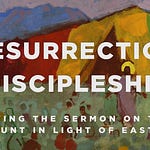What is something so valuable that you would give up everything for it?
The answers are pretty obvious: your kids, grandkids, perhaps a spouse or a best friend.
But here’s the kicker—I’ve been thinking about this question all week, and I’ve come to realize that there are also some pretty obvious wrong answers. Like a high-paying office job, a sports team, a vacation, wealth, or power. Sure, we might say we’d give up everything for these things, but when it comes down to it, we wouldn’t give up everything. We’d give up some things, sure, but not everything.
Dietrich Bonhoeffer was a young German pastor, a brilliant theologian, and—most importantly—someone who actually believed what Jesus preached. Imagine that?! A pastor and theologian taking Jesus seriously. You may think that I am joking, but too often, we, professional Christians, fail to take Jesus at his word. Through theological maneuvering, we twist Jesus’ words to fit into a sermon (proof-texting) or a political argument we are clothing in the disguise of theology (eisegesis). When the German church rolled over for Hitler, Bonhoeffer stood up. When others excused their silence as “staying out of politics,” Bonhoeffer called it out for what it was: cowardice disguised as faith. He joined the Confessing Church, trained underground pastors, and even became involved in a conspiracy to assassinate Hitler.
And what did it get him?
Prison. Execution.
But before that, he gave us one of the most important books of modern Christianity: The Cost of Discipleship. It is a book that we will use throughout Lent
In The Cost of Discipleship, Bonhoeffer warns us about cheap grace[i]—the grace that baptizes without transformation, forgives without repentance, and offers Christ without the cross. Instead, he calls us to costly grace—the kind of grace that will make you leave your nets, sell everything for the pearl of great price, and follow Jesus into the unknown.
As United Methodists, we love grace. We love grace so much that we have a theology of grace that names three types of grace: prevenient, justifying, and sanctifying. Many of you have asked me why I, in nearly every sermon, begin and end with grace. And the answer is quite simple: without God's grace, none of us would be here. I love grace. We love grace. But Bonhoeffer asks: Do we love it enough to let it change us?
Jesus gives us two parables in just three verses. While some of His parables seem to drag on and on, the parables of the hidden treasure and pearl of great cost are perhaps some of the most efficient preaching ever done.
Jesus tells us the Kingdom of God is like a guy who stumbles across a treasure buried in a field. He freaks out, covers it back up, and then, with joy, sells everything he owns just so he can buy that field. Then there’s this merchant, already searching for fine pearls, who finds the pearl of great price. He doesn’t hesitate—he sells everything to make it his.
And here’s the thing—neither of these guys are sad about what they’re giving up. Notice: Jesus doesn’t say they debated it, they considered their options, or they weighed the pros and cons. They did not call their financial advisor. They are not moping around, saying, “Well, I guess I’ve gotta give up all my stuff to follow Jesus now.” No! They are pumped. They know they’ve found something that makes everything else seem worthless in comparison. This isn’t loss—it’s gain. Jesus says the first man acted out of “joy.”[ii]
That’s what Bonhoeffer is getting at when he talks about costly grace. This isn’t just about giving things up for the sake of giving them up. It’s about discovering something so real, so beautiful, so life-changing that you can’t help but go all in. Costly grace isn’t a burden—it’s joy. It’s not a price to pay—it’s a treasure to find.
Bonhoeffer put it like this, “Costly grace is the treasure hidden in the field… the pearl of great price… the call of Jesus Christ at which the disciple leaves his nets and follows him.”[iii]
Lent is a time of the year when the life of the Church is turned upside down. It rolls around every year, and we treat it like it’s a spiritual placebo—give up coffee, skip dessert, maybe cut back on screen time. Giving up things for six weeks that we know we should’ve done for the previous 46. And sure, those things can be good. But Jesus isn’t asking for our caffeine addiction—he’s asking for our lives.
This season isn’t about proving how much willpower we have. Lent is about waking up to the reality of grace—real grace, costly grace, the kind that flips our world upside down. Grace isn’t just a pat on the back or a free pass to keep living the same way. Grace is a gift so wild, so life-changing, that once we truly encounter it, there’s no way we can stay the same.
Lent is a time to examine what we cling to that keeps us from fully surrendering to Christ, and I am not convinced those things are chocolate, caffeine, or screen time.
Jesus tells us the guy who finds a treasure buried joyfully sells everything to buy that field. Not out of obligation. Not because he’s being forced to. But because he knows it’s worth it. And this is what Bonhoeffer means when he talks about costly grace. He says:
“Costly grace confronts us as a gracious call to follow Jesus, it comes as a word of forgiveness to the broken spirit and the contrite heart. Grace is costly because it compels a man to submit to the yoke of Christ and follow him.”[iv]
Let’s be honest: We don’t usually think of discipleship as joy. We think of it as duty. We think of things like Bible study and meditation as just another thing that we are supposed to do, but we don’t really want to do them. As sacrifice. As loss. We treat following Jesus as if we’re taking on some heavy burden, as if God is up in heaven saying, “Let’s see how much they can suffer for me.” But that’s not how Jesus talks about the kingdom.
A man finds a treasure hidden in a field. A merchant stumbles upon the pearl of great price. And what do they do? They sell everything with joy. Not reluctance. Not gritted teeth. Joy. Because when you see what’s real, you don’t hesitate—you move.
The problem with so much of our preaching, so much of “prescriptive” Christian living, is that we make discipleship sound like a funeral march when it should be a celebration. Jesus doesn’t say, “Come follow me and be miserable.” He says, “My yoke is easy, and my burden is light.”[v] Bonhoeffer understood this. The call to costly grace isn’t about loss—it’s about discovering something so infinitely good that nothing else compares.
The world does not need to hear another sermon about what they should give up. Shoulding on someone rarely brings good news. We need to hear good news—so compelling and overwhelmingly true that it moves us.
Let’s get one thing straight: Jesus Christ did not come to offer us cheap grace. He didn’t come to give us an easy out or to rubber-stamp whatever life we feel like living. He came to give us costly grace—the kind that shakes us up, turns us around, and makes us new.
I have said it before, and I will say it again:
“God loves you just as you are, but God loves you too much to leave you just as you are.”
The good news—the best news—is that this grace has already been bought and paid for. You did not earn it, and you cannot lose it. It’s already yours because Jesus gave everything to make it so. His life, His death, His resurrection—this is what costly grace looks like. Once you see it, once you get even a glimpse of it, you realize there is nothing in this world more valuable.
That’s what Lent is about. Not some gloomy self-denial, not a season of proving how much we can suffer, but a season of joy—joy in discovering that the grace of God is richer, deeper, and more powerful than we ever imagined. Cheap grace keeps us stuck. But costly grace calls us forward—into a new life, a better life, a life shaped by the love of Jesus Christ. In last Sunday’s Bible study, someone put it this way: “Cheap grace is about checking boxes. Costly grace means caring for the faith (through grace) we have received.” That’s the difference Bonhoeffer was getting at—cheap grace remains transactional, something we take for granted, while costly grace transforms us because we recognize the weight and worth of what Christ has done.
And here’s the promise: The cost is still His. The One who calls you is the One who carries you. The grace that transforms us is not our own doing—it is Christ, at work in us, conforming us to Himself. He does not call us to change by sheer willpower. He calls us to surrender—to trust that the same grace that saved us is the grace that will shape us. The cost of discipleship is real, but the burden is His, and the promise is sure: He will finish what He has begun in you.
So, as we enter Lent, we do not come with fear about what we’re giving up. We come with joy for what Christ has already given—and for what He is still doing in us. And for that, we say: Thanks be to God!
[i] Bonhoeffer writes, “Cheap grace means the justification of sin without the justification of the sinner. Grace alone does everything, they say, and so everything can remain as before.” Bonhoeffer, Dietrich. The Cost of Discipleship. Touchstone 1995. Page 43.
[ii] Matthew 13:44
[iii] Bonhoeffer. Page 45.
[iv] Ibid.
[v] Matthew 11:30

















Share this post